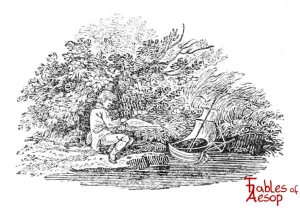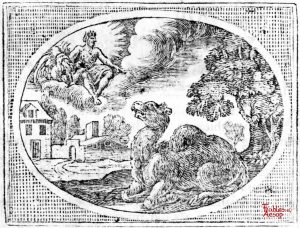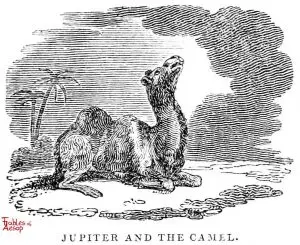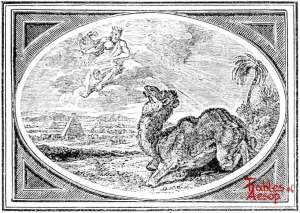The Camel complained to Jupiter about his stature relative to other animals. Jupiter was angry at this and that is why now Camels have shorter ears.
The Gods will deal with those who do not honor them.

Townsend version
The camel, when he saw the Bull adorned with horns, envied him and wished that he himself could obtain the same honors. He went to Jupiter, and besought him to give him horns. Jupiter, vexed at his request because he was not satisfied with his size and strength of body, and desired yet more, not only refused to give him horns, but even deprived him of a portion of his ears.

JBR Collection
The Camel once upon a time complained to Jupiter that he was not as well served as he ought to be in the means of defence and offence. “The bull,” said he, “has horns, the boar, tusks, and the lion and tiger, formidable claws and fangs that make them feared and respected on all sides. I, on the other hand, have to put up with the abuse of all who choose to insult me.” Jupiter angrily told him that if he would take the trouble to think, he would see that he was endowed with qualities shared by no other beast; but that, as a punishment for his unreasonable importunity, henceforward his ears should be shortened.

Samuel Croxall
THE Camel presented a petition to Jupiter, complaining of the hardship of his case, in not having, like bulls and other creatures, horns, or any weapons of defence to protect himself from the attacks of his enemies; and praying that relief might be given him in such manner as might be thought most expedient. Jupiter could not help smiling at the impertinent address of the great silly beast; but however rejected the petition; and told him, that, so far from granting his unreasonable request, henceforward he would take care his ears should be shortened, as a punishment for his presumptuous importunity.
THE APPLICATION
The nature of things is so fixed in every particular, that they are very weak superstitious people who dream it is to be altered. But, besides the impossibility of producing a change by addresses of this nature, they who employ much of their time upon such accounts, instead of getting, are sure to lose in the end. When any man is so frivolous and vexatious as to make unreasonable complaints, and to harbour undue repinings in his heart, his peevishness will lessen the real good which he possesses, and the sourness oi his temper shorten that allowance of comfort which he already thinks loo scanty. Thus, in truth, it is not providence, but ourselves, who punish our own importunity in soliciting for impossibilities, with a sharp corroding care, which abridges us of some part of that little pleasure which providence has cast into our lot.

Thomas Bewick (Jupiter and The Camel)
The Camel presented a petition to Jupiter, complaining of the hardships of his case, in not having, like bulls and other creatures, horns, or any weapon of defence to protect himself from the attacks of his enemies; and praying that relief might be granted him in such manner as should be thought most expedient. Jupiter could not help smiling at his impertinent ad- dress; but, however, rejected the petition, and told him, that so far from granting his unreasonable request, he would take care that henceforward his ears should be shortened, as a punishment for his presumptuous importunity.
APPLICATION.
The nature of things is so fixed in every particular, that they are very weak, superstitious people, who think that it can be altered. But besides the impossibility of producing a change by foolish importunities, they who employ much of their time in that way, instead of getting, are sure to lose in the end. When any man is so silly and vexatious as to make unreasonable complaints, and to harbour undue repinings in his heart, his peevishness will lessen the real good which he possesses, and the sourness of his temper shorten that allowance of comfort which he already thinks too scanty. Thus, in truth, it is not Providence, but ourselves, who punish our own importunity, in soliciting for impossibilities, with a sharp corroding care, which abridges us of some part of that little pleasure which Heaven has cast into our lot.
Happy the man without a wish for more, Who quietly enjoys his little store, And knows to heaven, with gratitude to pay Thanks for what's given, and what is ta'en away.


L’Estrange version (A Camel Praying For Horns)
It stuck filthily in the camel’s stomach, that bulls, stags, lions, bears, and the like, should be armed with horns, teeth, and claws, and that a creature of his size should be left naked and defenseless. Upon this thought he fell down upon his marybones, and begg’d of Jupiter to give him a pair of horns, but the request was so ridiculous that Jupiter, instead of horning him, order’d him to be cropt, and so punish’d him with the loss of his ears which nature had allow’d him, for being so unreasonable as to ask for horns, that Providence never intended him.
Moral
The bounties of heaven are in such manner distributed, that every living creature has its share; beside, that to desire things against nature, is effectually to blame the very author of nature it self.
[Note: Marybones comes from Chaucer and generally means “marrow bones.” From the context in this fable, the reference is to knees.]

Camelus et Iuppiter
Camelus, se despiciens, querebatur tauros ire geminis cornibus insignes, se inermem obiectum esse ceteris animalibus; orat Iovem cornua sibi donare. Iuppiter cameli stultitiam ridet; nec modo negat votum, verum et decurtat bestiae auriculas.
Moral
Quisque sit contentus sua Fortuna; etenim multi, meliorem secuti, peiorem incurrere.
Perry #117


